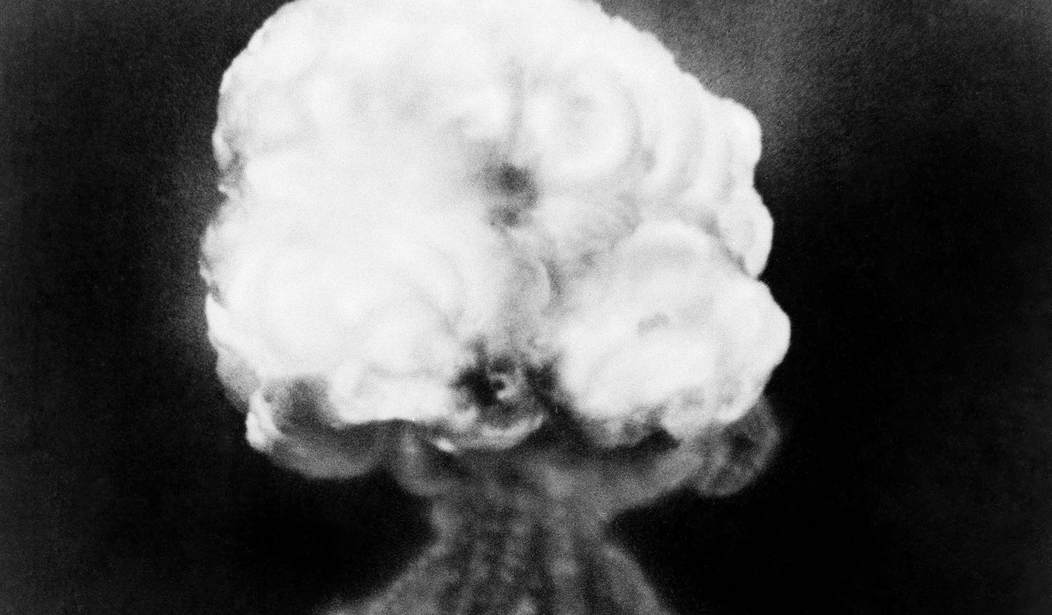In the latest example of liberal media losing the plot in the middle of a news cycle, The Atlantic has a piece out warning that, "on top of everything else" a nuclear bomb would do, the "climate problem" caused by a nuke attack and subsequent fossil fuel-driven rebuilding would destroy the livability of earth's climate.
Unfortunately, no, this isn't The Onion or The Babylon Bee, though the lines between liberal "news" and straight-up satire continue to blur.
In this instance, The Atlantic is sounding the alarm that not just energy policy, but foreign policy and (presumably) its failure that leads to a nuclear war, is a "domain that has a direct bearing on whether we have a livable climate or not."
There are no words. I mean, absolutely none, to describe this: pic.twitter.com/GjyEGkL4Dp
— Joe Concha (@JoeConchaTV) March 13, 2022
Because if, God forbid, a nuclear power such as Russia decides to unleash a nuclear attack, we should apparently be most concerned about its impact on global temperatures, sea levels, etc. than what such a step would mean for the global balance of power and future of peace, not to mention the survivability of subsequent retaliatory strikes.
It's a take almost as wild as the U.S. government updating its guidance for surviving a nuke blast to include a recommendation for pandemic protocols to ensure you and your fellow huddled masses in fallout shelters are masked up, social distanced, and staying safe from COVID in the midst of a nuclear attack.
According to The Atlantic, a potential nuclear exchange — likely between Russia and the United States — "would be worse for the climate than any energy policy that Donald Trump ever proposed. I mean this quite literally," Robinson Meyer writes. "If you are worried about rapid, catastrophic changes to the planet’s climate, then you must be worried about nuclear war," he argues in the piece.
Recommended
"That is because, on top of killing tens of millions of people, even a relatively 'minor' exchange of nuclear weapons would wreck the planet’s climate in enormous and long-lasting ways."
Killing tens of millions of people? Collateral damage. Wrecking the planet's climate? Now that's alarming, apparently.
After explaining the immediate devastation caused by a one-megaton nuke blast that "would rapidly turn an eight-mile blast radius into a zone of total human misery," Meyer contends that "only at this moment of the war do the climate consequences truly begin" before forewarning the climate impacts that would follow:
The hot, dry, hurricane-force winds would act like a supercharged version of California’s Santa Ana winds, which have triggered some of the state’s worst wildfires. Even in a small war, that would happen at dozens of places around the planet, igniting urban and wildland forest fires as large as small states. A 2007 study estimated that if 100 small nuclear weapons were detonated, a number equal to only 0.03 percent of the planet’s total arsenal, the number of “direct fatalities due to fire and smoke would be comparable to those worldwide in World War II.” Towering clouds would carry more than five megatons of soot and ash from these fires high into the atmosphere.
All this carbon would transform the climate, shielding it from the sun’s heat. Within months, the planet’s average temperature would fall by more than 2 degrees Fahrenheit; some amount of this cooling would persist for more than a decade. But far from reversing climate change, this cooling would be destabilizing. It would reduce global precipitation by about 10 percent, inducing global drought conditions.
...
And even though the world would get cooler, the nuclear winter resulting from a full-blown global conflict (or even “nuclear fall,” as some researchers prefer) would not reverse the effect of what we might morbidly call “traditional” human-caused climate change. In the short term, the effects of ocean acidification would get worse, not better. The layer of smoke in the atmosphere would destroy as much as 75 percent of the ozone layer. That means that more UV radiation would slip through the planet’s atmosphere, causing a pandemic of skin cancer and other medical issues. It would affect not just humans, either—even on the remotest islands, the higher UV rates would imperil plants and animals otherwise untouched by the global carnage.
What's more, The Atlantic worries, "several years of gasoline- and diesel-fueled conventional military operations" may follow "the global destruction" caused by a nuclear war and would mean that "the permanent consequences for the climate system would be even worse." And if rebuilding is possible, The Atlantic frets further that "undertaking a fossil-powered reconstruction" would be the only available option because "renewables, wind turbines, and other decarbonization technology" depend "on everything that peace provides."
Imagine the horror of a post-nuclear war world in which CO2 emissions are your biggest worry.
So take note, Americans and global citizens — we must worry about nuclear war not so much because of its destabilizing impact and resulting devastating loss of human life, but because a smoldering Europe or North America would mean a destroyed ozone layer and sunburned plants and animals elsewhere around the globe followed by a fossil-fuel driven campaign to rebuild civilization.
Oddly enough, the closing line of The Atlantic's climate-panic-in-nuclear-war screed makes a half-honest admission: "Solving climate change is a luxury of a planet at peace with itself."
Indeed, like many of the left's pet projects, climate change is something that becomes a life-dominating and judgement-clouding endeavor only when life as we know it is so good that there's little else to worry about.
























Join the conversation as a VIP Member